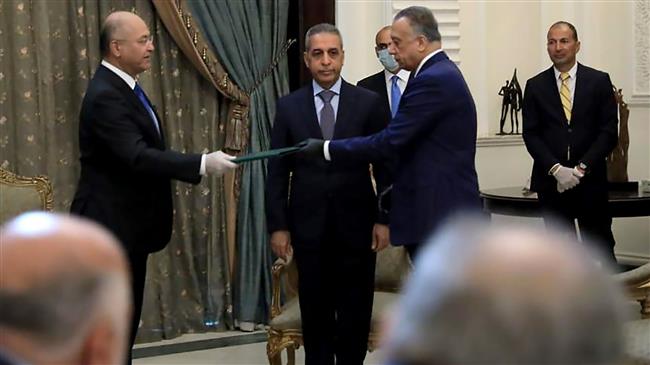
A handout picture released by the media office of the Iraqi Presidency on April 9, 2020 shows President Barham Saleh (L) swearing in Mustafa al-Kadhimi as new Prime Minister-designate. (Via AFP)
Iraq has designated a new Prime Minister that, contrary to his two predecessors, apparently enjoys inclusive support from the various political blocs in a development that suggests the defeat of the United States attempts at forcing its choice on the Arab nation.
On April 9, President Barham Salih tasked Mustafa al-Kadhimi, director of Iraqs National Intelligence Service, with forming a new government in a month. The president said Kadhimi was a "fighter and intellectual who is well known for his integrity, moderation, and keenness [to honor] the rights of the Iraqi people."
The presidential ceremony was attended by several high-ranking politicians and public figures, something that reflected Kadhimis across-the-board popularity with Iraqs political groupings.
The New Arab or al-Araby al-Jadeed, a London-based pan-Arab media outlet, interpreted the broad guest list as "a sign that Kadhimi will likely find success at forming a government."
Among the participants, there was Hadi al-Ameri, secretary general of the Badr Organization, which leads the Fatah (Conquest) Alliance at the Iraqi parliament. The US has blacklisted Ameris organization as "terrorist," apparently in response to Ameri and his followers staunch disapproval of any US-led military interference in the Arab country.
Iraqs pro-government Kataib Hezbollah group, part of the Popular Mobilization Units (PMU) anti-terror force - which has been a constant target of Washingtons military and political attacks - also did not oppose Kadhimis nomination.
The Washington Post, meanwhile, cited an Iraqi official as pointing to the USs yet-unannounced displeasure at Kadhimis nomination. "They dont fully trust Kadhimi," the official said.
The Prime Minister-designate was tapped for the job hours after the former nominee Adnan al-Zurfi, which The Post identified as "Washingtons favored candidate," withdrew his bid. Zurfi cited "domestic pressure" among other things for backing down, as well as his failure to garner uniform support from Iraqs political blocs.
Zurfi had been appointed after his predecessor Mohammed Allawi likewise said he had given up on forming a government after facing opposition from some Iraqi political factions.
The New Arab said both previous candidates had been found to be "too close" to Washington. Reuters, though, described Kadhimi as "a political independent."
Irans Foreign Ministry Spokesman Bahram Mousavi called his designation "a right step in the right direction." "The Islamic Republic has invariably supported independence, national sovereignty, territorial integrity, and political stability in Iraq, and considers formation of consensus among all of its political movements through democratic pathways to be the only peaceful solution out of differences."
Iraj Masjedi, the Iranian Ambassador to Baghdad, also said Tehran had a "positive view" of the nomination, saying the choice represented one by the entire Iraqi society.
Kadhimis potential success in forming a government - for a country that has been without one since last November when the last incumbent Prime Minister Adel Abdul-Mahdi resigned amid protests against alleged corruption and misuse of national resources - would translate into even further unity among Iraqi ethnicities and political actors, which have traditionally comprised a mixture of Shias, Sunnis, and Kurds.
"With my mandate to lead the Iraqi government, I pledge to my honorable people to work to form a government that puts the aspirations and demands of Iraqis as the top priority," he tweeted shortly after his appointment was announced.
He also denounced armed violence, which the country has been pestered with since a 2003 US-led invasion, asserting that all weapons should only be in the hands of the government.
‘Iraq sovereignty red line
"Iraqi sovereignty is a red line," Kadhimi added in a reference to unauthorized foreign interference as represented by a US drone strike against Baghdad in early January.
On January 3, a US drone strike assassinated Lieutenant General Qassem Soleimani, the commander of the Quds Force of Irans Islamic Revolution Guards Corps (IRGC), Abu Mahdi al-Muhandis, the second-in-command of the PMU, or Hashd al-Shaabi, and a number of others, targeting their vehicle in Baghdad. At the time of the attack, General Soleimani was on an official trip in the Iraqi capital at Baghdads request.
Prior to his martyrdom, General Soleimani would provide indispensable contribution to the regional fight against Takfiri terrorism, which has largely been suspected of being the brainchild of Washington and its allies. The assistance empowered Iraq and Syria to defeat the Takfiri terrorist Daesh outfit in late 2017. The overall role played by the commander has earned him hero status as the regions most decisive and revered counterterrorism figure.
The assassinations were followed by thousands-strong funeral processions and protests across both Iran and Iraq in honor of the commanders and condemnation of the USs nearly two decades of deadly interference in the region. Only days after the atrocities, the Iraqi parliament voted overwhelmingly in favor of a law mandating complete withdrawal of all US-led forces from the countrys soil.
Ever since, the US forces are reported to have left a number of its military bases across the country.
An Iraqi security source said in early April that a group of US troops had withdrawn from al-Taqaddum Airbase in Anbar, and moved to Ain al-Assad Airbase in the western Iraqi province. There have been other reports that US forces are handing over more military bases to Iraqi forces and taking their troops to more secure facilities elsewhere in Iraq.
Last June, various Western media outlets alleged that a US missile-launching cruiser had been put on a 72-hour standby "to attack Iran," with a Pentagon official saying the Ticonderoga-class vessel USS Leyte Gulf has been mobilized "for a possible strike."
Observers, however, began downplaying such repeated acts of American military adventurism after witnessing Washingtons desertion of its Iraq-based outposts following the Iraqi parliamentary vote.
SOURCE: PRESS TV
LINK: https://www.ansarpress.com/english/15731
TAGS:






























 online news tv
online news tv




